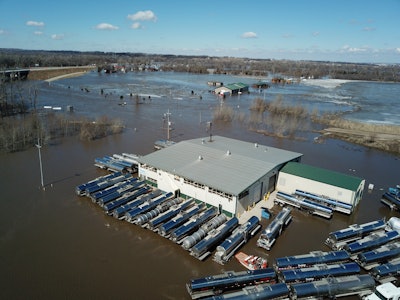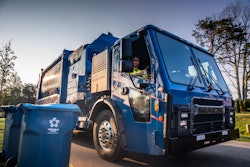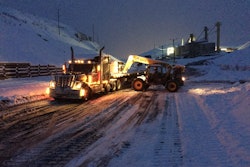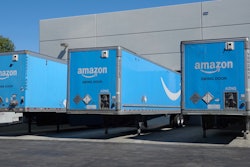The 2022 Atlantic hurricane season from a historical perspective is best described as average: an average number of named storms, a just above-average number of hurricanes and a slightly below-average number of major hurricanes.
Dr. Adam Lea and Nick Wood, Department of Space and Climate Physics at University College London, forecast the 2023 season to be similarly subdued, calling for activity in 2023 will be about 15% below the 1991-2020 30-year norm and close to the long-term 1950-2022 norm. The duo expects six six hurricanes this season – which begins June 1 – three "intense hurricanes" and 13 tropical storms.
With just more than three months, motor carriers have plenty of time to develop a response plan in the event of a disastrous weather event and even while expectations for this coming season aren't alarming, it's easy for companies to find themselves behind the eight ball when a storm spins up and steams for the coastline.
Houston-based Jetco Delivery went through hurricanes Ike and Harvey in recent years. Hurricane Harvey made landfall three times in August 2017, dumping annual average rainfall totals in less than a week on Houston and southeastern Texas.
#Harvey in perspective. So much rain has fallen, we’ve had to update the color charts on our graphics in order to effectively map it. pic.twitter.com/Su7x2K1uuz
— National Weather Service (@NWS) August 28, 2017
With many regional ports shuttered, customers affected and more than 300 area roads closed due to flooding, Jetco pivoted from serving its clients to serving its community. Only a day into the storm, Texas Gov. Greg Abbott placed a call for help, asking for rescue boats to help stranded citizens. Jetco drivers moved the boats 40 miles from a location on the north side of Houston to the National Guard staging area in Katy.
Harvey, the second-most costly hurricane to hit the U.S. mainland in more than 120 years, also helped then-Jetco President Brian Fielkow, who now serves parent company GTI Group as Strategic Advisor and Board Member – refine his management style. He said the most effective way to navigate a crisis is to work with one foot directly in the event itself while also focusing on tomorrow.
“When we went through Harvey, we looked at not only how we were going to survive but also how we were going to thrive,” Fielkow said. “We’re going through the same thing now with COVID-19. It’s a very painful process for all of us.”
The devastation COVID-19 is leaving behind may not be as obvious as the visible damage following a hurricane, wildfire or flood, but make no mistake: The pandemic has been a natural disaster for those ill-equipped to handle it.
Fielkow said it’s important to access what the company is learning via its disaster response and pull those lessons forward to be stronger and better. The most important thing to understand is that outcomes are generally tied to leadership ability, he said.
“The first thing I learned in Harvey is that I couldn’t lead anybody if I wasn’t ready,” he said.
Having a business continuity plan is a large part of being ready for would-be disasters, but it can be difficult to plan ahead from all angles, and you don’t have to live in an active weather area to need one. Unlike hurricanes that can come with several days of advance warning, floods, structure fires, tornadoes and pandemics can be sudden and unexpected.
Plattsmouth, Nebraska, suffered a generational flood in early 2019, and “while it’s near the river, it’s never been wet in the last 100 years of recorded history,” said Evan Schmidt, Liquid Trucking’s tech expert. “You don’t ever dream of this kind of thing happening to you.”
 Plattsmouth, Nebraska, suffered a generational flood in early 2019, and Liquid Trucking’s terminal was uninhabitable for a period of time.
Plattsmouth, Nebraska, suffered a generational flood in early 2019, and Liquid Trucking’s terminal was uninhabitable for a period of time.Its terminal rendered uninhabitable by floodwaters, Liquid Trucking was able to move its operation to a nearby car dealership to maintain operation while Evan Schmidt worked to keep the company’s technology infrastructure above water.
“We’d been preparing in all the wrong places,” added Josh Schmidt, the company’s general manager. “It goes to show you that you can be as prepared as you want, but when disaster strikes, it can literally be anything.”
In October 2018, Florida Rock & Tank Lines was impacted by Hurricane Michael, the first Category 5 hurricane to hit the U.S. mainland in 26 years. Being based in Jacksonville gives the company plenty of opportunity to test its business continuity plan, but Jim Anderson, vice president of safety and risk management, said it’s critical that the plans undergo an annual review.
“Over the years, we have worked to have a standardized plan,” he said, noting the plan is reviewed every year in May. “Doing that, you’re able to double-check and make sure that everything that needs to be thought about has been considered.”
Among the benefits of a disaster response plan is that they are flexible. Not all parts will be applicable in every event, but parts of it will be portable. For example, Anderson said his company’s continuity plan included a response for a pandemic, “but I don’t think we ever could have imagined that we would be faced with the [COVID-19] situation we’ve had to work through.”
Having never been through an event can make it difficult to plan a response, Anderson said. He said having an action plan “as a baseline to work from helped us have the fundamental structure in place as [COVID-19] started to ramp up,” he said. “That was a really good thing for us to have in place … to manage through this with the least disruption as possible.”
The extended nature of the pandemic's disruption caught the company by surprise.
“Typically the things that you would have in a hurricane are of a shorter duration that what we’ve experienced here with a pandemic,” he said. “That’s probably the one thing that we’d put more thought into going forward is having extended disruption to the business operation.”
Liquid Trucking integrated what it learned from the company’s flood response into an updated disaster preparedness plan, which Josh Schmidt said made the transition to working from home during COVID-19 much easier.
Business continuity plans don’t have to be event-specific, Fielkow said. Rather, they should lay the groundwork on how to navigate a disruption and allow fleets to “pick and choose” the parts of the plan that are most applicable, he said.
“What we learned in Harvey, quite quickly, was that our employees were more than capable of working remotely,” Fielkow said. “Because we had a plan in place to basically shift our phones, computers [and] everything remotely, it worked. We were kind of able to pick up on that playbook to use that.”
“I had no idea going into COVID-19 that we’d be working remotely for as long as I think we’re going to,” he added. “But the point is, we haven’t really missed a beat, and the fact that we’re able to do this so well comes out of learning in Harvey how to work remotely. And that’s all documented in the business continuity plan, making sure our IT is in the cloud … employee assistance plans. There were parts of the plan that were applicable to COVID-19.”
What Jetco learned through COVID-19, Fielkow said, will be folded into the company’s preparedness plan.
“We’re getting smarter in a whole new area,” he said. “It’s iterative. Every challenge leads to new learnings.”
Similarly, Liquid Trucking will include its coronavirus response in its updated plan.
“I know it seems reactionary, but how do you plan for some of this stuff?” Josh Schmidt said. “And this is going to help our flood plan, too. We’ve got people that have been working from home. We’ve made some adjustments. We’ve had some good ideas from employees. Whatever happens next, I think we’re going to be that much more versatile.”











